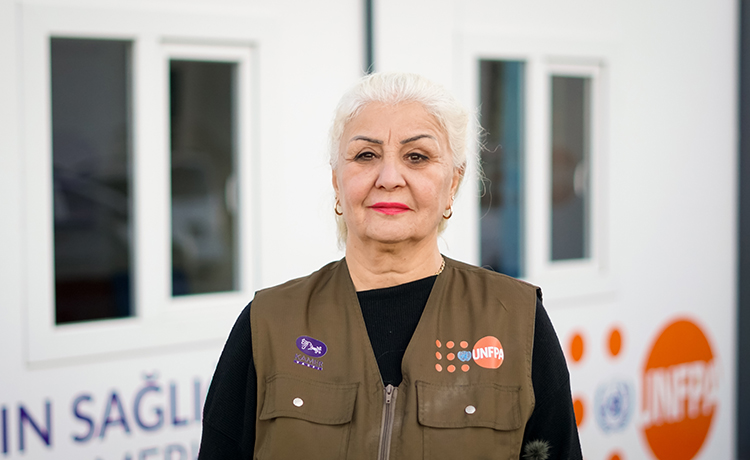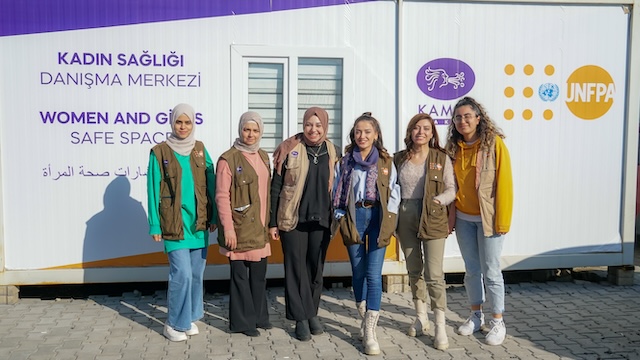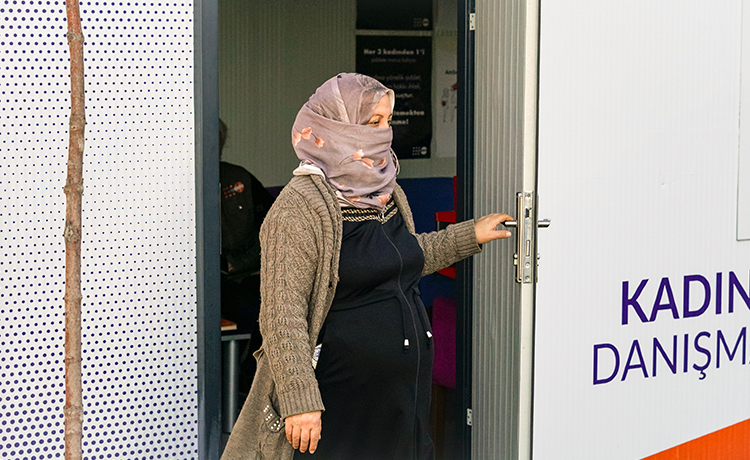News
Communities in healing, a year after two tragic earthquakes shook southern Türkiye
- 06 February 2024
News
KAHRAMANMARAŞ/MALATYA, Türkiye – “She was there when I needed someone most, providing essential help in dire times,” said Zeynep*.
The 47-year-old single mother of three was already a survivor of child marriage, abuse by her husband and uterine cancer when two earthquakes struck Syria and Türkiye on 6 February 2023, destroying her home and all her belongings.
With nowhere to go and in desperate need of care – especially for her son, who was struggling with substance abuse issues – Zeynep sought shelter and support at a nearby safe space for women and girls. There, she found protection and a person with whom she could share her burdens: Her “angel”, a health-care worker named Nilüfer Kısak.
“She was my ray of hope, helping my son with treatment, guiding me through tough times,” Zeynep said.
Around the world, UNFPA – the United Nations sexual and reproductive health agency – supports safe spaces for women and girls, places where those made vulnerable by crisis and catastrophe can access health care, gender-based violence case management services and psychosocial counselling.
At the Malatya safe space, Nilüfer and her team have worked constantly over the past year to offer compassionate care to survivors like Zeynep. “We have never stopped; we are reaching every corner, every district, and will continue to do so,” she said.

A rippling crisis
The earthquakes caused widespread destruction, affecting more than nine million people in Türkiye. With hundreds of thousands still living in temporary shelters, vulnerability to violence, sexual exploitation and abuse has soared. Meanwhile, some 64,000 pregnant women and more than a million girls of reproductive age are in need of urgent care.
One year on, communities are struggling to rebuild; many health facilities and gender-based violence prevention centres remain closed, leaving women and girls at heightened risk.
To plug this gap in services, UNFPA has established 25 mobile and static units across affected provinces of Türkiye. Safe spaces in Malatya and Kahramanmaraş, funded by Ireland and Norway and run together with local partner the KAMER foundation, provide earthquake survivors family planning consultations, prenatal and postnatal check-ups, gender-based violence prevention and response services, psychosocial support and dignity and maternity kits.
In the midst of the earthquake recovery zone, nurse Azize Diyab took shelter in a cramped school classroom. “Daily survival became a struggle,” she recalled. She had fled the war in Syria in 2013 to pursue her education, later graduating in nursing and receiving Turkish citizenship. Now with a UNFPA-supported mobile unit, Azize was able to reach women and girls across Malatya with reproductive health information and prenatal consultations.
These services are vital for women like Ferize Cuma, who is eight months pregnant and living in temporary container housing in Türkiye. A refugee from Syria, which she fled in 2012 at age 16, Ms. Cuma had only just recently moved from a refugee camp to an apartment in Malatya when the earthquakes struck and her building was destroyed.
At the UNFPA safe space where she sought help, Ms. Cuma was able to attend sexual and reproductive health training sessions – a crucial development, given her current lack of access to basic health care and hygiene facilities. “They taught us about nursing, prenatal care, childbirth and breastfeeding,” she said.

A path to recovery
Pregnancy and childbirth continue through conditions of all kinds, including crisis. Fatma El Ahmed, who arrived in Türkiye from Aleppo, Syria, in 2014, was pregnant with her fourth child when the earthquake happened. Fortunately, the family managed to escape their home with their lives – everything else was behind.
“The situation was very difficult because I was pregnant,” Ms. Ahmed said. “There is a health centre nearby, but we can only go there in emergencies.”
While living in a tent her family shared with four other families, Ms. Ahmed went into labour, and gave birth by Caesarean section. The team from the safe space in Kahramanmaraş, where they were living, provided her with hygiene and maternity supplies in the aftermath of her surgery.
“The support I receive from the safe space is very important,” she said.
Since the earthquake, UNFPA has reached more than 130,000 people with essential sexual and reproductive health services and protection against gender-based violence. With the support of the governments of Japan, New Zealand, Romania and the United States, UNFPA will continue to operate safe spaces for women and girls across affected areas.

*Name changed for privacy and protection